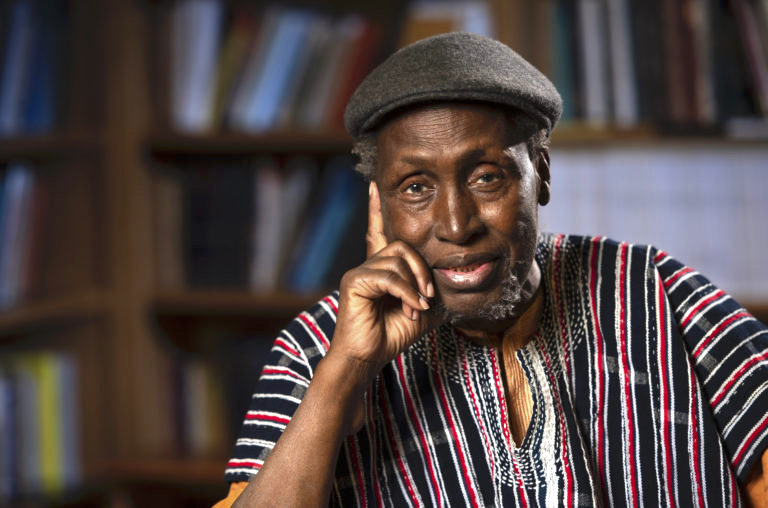London
New York
© Abibiman Publishing 2025
Subscribe To Our Newsletter
- Enter your email to get notified about our new updates

By Onyeka Nwelue
NGUGI wa Thiong’o. The name itself is magical. Peculiar tone markers, an apostrophe in an unusual place, distinct from where you’d find it in those Irish names that users and observers of the English language worldwide are accustomed to – O’Brien, O’Toole. But the magic is not just in the name of the man, but in his craft: Ngũgĩ wa Thiong’o is one of the world’s greatest writers.
There is absolute perfection in the writings of this formidable Kenyan writer, but the West continues and will continue to disrespect and disregard him, because we, Africans, have yet to rally around and stand behind him fearlessly, and in a manner that makes it clear to the West that Ngũgĩ wa Thiong’o does not need to be validated by them. Isn’t it time for we Africans to assert ourselves in the enterprise of upholding Ngugi’s legacy, against what must now be seen as a conspiracy to withhold from him his due?
Last year, I instituted the James Currey Prize for African Literature, in honour of James Currey, whose contribution to African literature, although largely unknown, is immeasurable. I met Currey in Accra many years ago and on that occasion, we spent hours talking about my aunt, Flora Nwapa, the subject of one of my foremost film projects. Such positive energy, when I needed it replicated with Ghanaian writer, Atukwei Okai, was not given to me. Okhai simply waved me aside and said: “Next time. I don’t have time for any interview now!” Okai is dead now. Nobody documented him. I can bet that most of the people who will read this do not know who he is.
I had similar experiences with Zainab Alkali and Catherine Acholonu. Professor Acholonu, for her part, was convinced that I wanted to make money off her, with the documentary I proposed to make in her honour. She too is dead now. Nobody documented her.
I had a bad experience too, with Elechi Amadi, author of The Concubine. He claimed I used his name to get money from Bayelsa State Government. He eventually got through to the Governor, who told him nobody gave me money for him. It was already late when he realised he messed up. He is dead now. Nobody documented him.
I recently co-created a publishing venture with my long-timefriend, Chudi Igweonu, who lives in the United States of America. The creation of that outfit was inspired by the neglect and condescending attitude of the powers that lord over the publishing landscape in the West. We called it Abibiman Publishing. I am trying to establish a pattern here: it is up to us to tell the stories of our creative enterprise how we want to tell it. It is up to us to validate ourselves!
I come from a legion of creatives: filmmakers, writers, singers and intellectuals. One of my ancestors, Obua Ajukwu, was the master of the popular King Jaja of Opobo. So, it is hard for people in my maternal family, to wait, or beg for validation. We go out there and do it!
The organisers of the International Booker Prize displayed a high level of disrespect for the great Ngũgĩ wa Thiong’o through the shortlist for the 2021 edition of their famous prize. I do not know what the criteria for judging entries are and, just as it is with the James Currey Prize for African Literature, the jury will independently decide what guidelines they will use to award winners. I have no business with that. However, the effort Ngũgĩ wa Thiong’o put in the project, from writing in an African language and translating it into English, clearly shows how passionate and dedicated this man is, to language and art.
But here is the thing: instead of us to spend time blaming the colonial powers for acting as self-appointed gate-keepers of literary excellence, we can become players on the literary political landscape. Where are those Africans with sizeable war chests who can institute prizes that handsomely reward literary excellence? Let them step forward now!
What we hope to do with Abibiman Publishing is to avoid such scenarios where the authors of books first published in Africa or the Caribbean receive heartbreak publishers and agents in the West reserve for them. These publishers and agents always say, “We can’t publish this work if it is not published first in the US.” And I ask: “Who are you to say that?” This snobbery, detachment and air of superiority is nauseating. And most Africans who work in publishing houses in the UK and the US, never get to rise to positions where they can make real editorial and publishing decisions. All of them are either assistant editors or given some flowery designations that are reserved for people who serve tea in the offices. They never make any decision that will affect writings from Africa positively. They are like robots and eunuchs.
I’ve had private conversations with younger authors and we all agree that Ngũgĩ wa Thiong’o needs to stop submitting his works for prizes. He is bigger than all of them. How do we get access to him? To discuss setting up platforms like: Ngũgĩ wa Thiong’o Prize for Global Literature? Ngũgĩ wa Thiong’o Writers’ Residency? Ngũgĩ wa Thiong’o Literature Conference?
These ideas are not scary. They can be done, but the question is: is he accessible to accept these? And does he know, that, genuinely, he is bigger than the entire Western literati?

London
New York